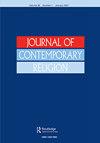Old Religion, New Spirituality: Implications of Secularisation and Individualisation in Estonia
IF 0.6
3区 哲学
0 RELIGION
引用次数: 0
Abstract
chronically contested the territorial pattern of what we call Europe has been throughout its long history and how varied the cultures are that have found a sometimes precarious home on the Continent. Miri Freud-Kandel, for example, points out in her chapter on “Judaism and Europe” that, until the Second World War, Europe had been the primary home of Judaism for centuries and, despite all the expulsions and pogroms Jews suffered, the Continent’s history was intimately intertwined with Judaism’s development right up to the Enlightenment and beyond; today, after the Shoa and then the foundation of the State of Israel in 1948, most Jews now live in Israel or the USA. ‘West’ and ‘East’, as applied to Europe, are revealed by this book as an oversimplified and contentious dichotomy. Migration and violently contested borders feature as a chronic element in European life rather than a recent ‘problem’. The complex intertwining and competition of religion and politics is a central ongoing fact of European life, even in the present era of increased secularisation at the level of many individual lives. Religion is still liable to be ‘weaponised’ or ‘misappropriated’ by rulers to prop up their power or by demagogues to boost their appeal to ethno-nationalism, notably in projects to ‘homogenise’ populations living in particular territories. The book makes one wonder again to what extent what we claim as ‘Western values’ are distinctively Christian in origin. How far does Europe’s religious heritage still invisibly shape aspects of Europe’s contemporary ‘secular’ culture? What aspects of that heritage are actually jettisoned by the growing numbers of the ‘non-religious’? How significant is their distinctive religious history for the contemporary politics of European societies? These questions and many others are raised and discussed in this Handbook even if they can seldom be definitively resolved. The Oxford Handbook of Religion and Europe is an exemplary encyclopaedic project and will be an invaluable resource for historians, social scientists, theologians, and scholars of religious studies for some years to come, although, as editors of other encyclopaedias have found, updating is now easier in digital than in printed format. At a cost of over £100 most students will need to hope that this volume will be acquired by their institution’s library.旧宗教,新精神:爱沙尼亚世俗化和个体化的启示
我们称之为欧洲的领土模式在其漫长的历史中一直存在争议,文化的多样性有时在欧洲大陆找到了一个不稳定的家园。例如,Miri Freud Kandel在其关于“犹太教和欧洲”的章节中指出,在第二次世界大战之前,欧洲几个世纪以来一直是犹太教的主要家园,尽管犹太人遭受了所有驱逐和大屠杀,但欧洲大陆的历史与犹太教的发展密切交织,一直到启蒙运动及以后;今天,在1948年犹太战争和以色列国成立之后,大多数犹太人现在生活在以色列或美国。本书揭示了适用于欧洲的“西方”和“东方”是一种过于简单化和有争议的二分法。移民和激烈争夺的边界是欧洲生活中的一个长期因素,而不是最近的“问题”。宗教和政治的复杂交织和竞争是欧洲生活中一个核心的持续事实,即使在当今许多个人生活日益世俗化的时代也是如此。宗教仍然容易被统治者“武器化”或“挪用”,以支持他们的权力,或被煽动者“挪用”以增强他们对种族民族主义的吸引力,尤其是在“同质化”生活在特定领土上的人口的项目中。这本书让人再次怀疑,我们所声称的“西方价值观”在多大程度上是基督教的。欧洲的宗教遗产在多大程度上仍然无形地塑造了欧洲当代“世俗”文化的各个方面?这些遗产的哪些方面实际上被越来越多的“非宗教”抛弃了?他们独特的宗教历史对欧洲社会的当代政治有多重要?本手册提出并讨论了这些问题和许多其他问题,即使这些问题很少能得到明确解决。《牛津宗教与欧洲手册》是一个堪称典范的百科全书项目,在未来几年里,它将成为历史学家、社会科学家、神学家和宗教研究学者的宝贵资源,尽管正如其他百科全书的编辑所发现的那样,现在数字版的更新比印刷版的更新更容易。花费超过100英镑的费用,大多数学生都希望这本书能被他们学校的图书馆收藏。
本文章由计算机程序翻译,如有差异,请以英文原文为准。
求助全文
约1分钟内获得全文
求助全文
来源期刊

Journal of Contemporary Religion
RELIGION-
CiteScore
1.20
自引率
0.00%
发文量
59
期刊介绍:
Journal of Contemporary Religion is an international peer reviewed journal. Its purpose is to both document and evaluate the anthropological, sociological, psychological, and philosophical aspects of emerging manifestations of religiosity in any part of the world—whether within innovative movements or mainstream institutions. The term ''religion'' in the title of this journal is understood to include contributions on spirituality. Moreover, as the journal title suggests, the focus is on contemporary issues. Therefore, the editors of Journal of Contemporary Religion welcome submissions which deal with: classical topics in the study of religion, such as secularisation and the vitality of religion or traditional sectarian movements; more recent developments in the study of religion, including religion and social problems, religion and the environment, religion and education, the transmission of religion, the materialisation and visualisation of religion in various forms, new forms of religious pluralism, the rise of new forms of religion and spirituality, religion and the Internet, religion and science, religion and globalisation, religion and the economy, etc. theoretical approaches to the study of religion; discussions of methods in relation to empirical research; qualitative and quantitative research and related issues. The Journal includes reviews of books which reflect the above themes.
 求助内容:
求助内容: 应助结果提醒方式:
应助结果提醒方式:


